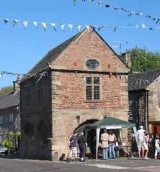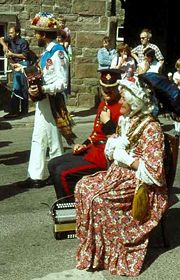
Winster
Encyclopedia
Winster is a former lead-mining village in the Derbyshire Dales
about 5 miles (8 km) from Matlock and 6 miles (10 km) from Bakewell
at an altitude of approx 250 metres (820.2 ft). The village, which lies within the Peak District
National Park, has a large number of listed buildings, including the Market House open daily as a National Trust information point. Its current population is about 630; the village has a primary school, two churches, two pubs, and a Village Shop (owned by the community) which includes a Post Office. Winster was mentioned in the Domesday book
in 1086 when it was owned by Henry de Ferrers
.
A workhouse
at Bank Top was opened in 1744. It had a rule that forbade any relief outside of the workhouse. By the 1770s it could house 40 inmates.
Winster Market House was the National Trust
's first property in the Peak District and was acquired in 1906.
 Winster's Parish Church is the Church of St John The Baptist, and a week-long annual carnival called Winster Wakes starts on the first Sunday on or after June 24 (the patronal day of St John The Baptist). The Main Street is closed briefly on the Sunday for the Wakes Parade, and for much of the following Saturday afternoon, when there are stalls and entertainment (including Morris Dancing
Winster's Parish Church is the Church of St John The Baptist, and a week-long annual carnival called Winster Wakes starts on the first Sunday on or after June 24 (the patronal day of St John The Baptist). The Main Street is closed briefly on the Sunday for the Wakes Parade, and for much of the following Saturday afternoon, when there are stalls and entertainment (including Morris Dancing
) in the street.
Cuddie refused to reply to the letter and the following afternoon the three Brittlebank brothers turned up in his garden with two loaded pistols. Cuddie reluctantly accepted one of the weapons. William Brittlebank walked 15 yards (13.7 m) away, turned and fired. Two shots were heard but only Cuddie was hit. He died a few hours later.
Two of the Brittlebanks were tried in Derby to be found not guilty of murder, while their brother William fled to Australia with a £100 reward on his head, never to return to England.
Derbyshire Dales
Derbyshire Dales is a local government district in Derbyshire, England. Much of the district is situated in the Peak District, although most of its population lies along the River Derwent....
about 5 miles (8 km) from Matlock and 6 miles (10 km) from Bakewell
Bakewell
Bakewell is a small market town in the Derbyshire Dales district of Derbyshire, England, deriving its name from 'Beadeca's Well'. It is the only town included in the Peak District National Park, and is well known for the local confection Bakewell Pudding...
at an altitude of approx 250 metres (820.2 ft). The village, which lies within the Peak District
Peak District
The Peak District is an upland area in central and northern England, lying mainly in northern Derbyshire, but also covering parts of Cheshire, Greater Manchester, Staffordshire, and South and West Yorkshire....
National Park, has a large number of listed buildings, including the Market House open daily as a National Trust information point. Its current population is about 630; the village has a primary school, two churches, two pubs, and a Village Shop (owned by the community) which includes a Post Office. Winster was mentioned in the Domesday book
Domesday Book
Domesday Book , now held at The National Archives, Kew, Richmond upon Thames in South West London, is the record of the great survey of much of England and parts of Wales completed in 1086...
in 1086 when it was owned by Henry de Ferrers
Henry de Ferrers
Henry de Ferrers was a Norman soldier from a noble family who took part in the conquest of England and is believed to have fought at the Battle of Hastings of 1066 and, in consequence, was rewarded with much land in the subdued nation.His elder brother William fell in the battle. William and Henri...
.
A workhouse
Workhouse
In England and Wales a workhouse, colloquially known as a spike, was a place where those unable to support themselves were offered accommodation and employment...
at Bank Top was opened in 1744. It had a rule that forbade any relief outside of the workhouse. By the 1770s it could house 40 inmates.
Winster Market House was the National Trust
National Trust for Places of Historic Interest or Natural Beauty
The National Trust for Places of Historic Interest or Natural Beauty, usually known as the National Trust, is a conservation organisation in England, Wales and Northern Ireland...
's first property in the Peak District and was acquired in 1906.
Winster Wakes

Morris dance
Morris dance is a form of English folk dance usually accompanied by music. It is based on rhythmic stepping and the execution of choreographed figures by a group of dancers. Implements such as sticks, swords, handkerchiefs and bells may also be wielded by the dancers...
) in the street.
Death of the Doctor
In May 1821 a young surgeon, William Cuddie was killed in one of the last duels to take place in England. Cuddie was aged 31 and had fallen in love with Mary, the daughter of the wealthy Brittlebank family of Oddo House. For some reason one of her brothers, William Brittlebank, tried to keep them apart. One evening the two men quarrelled. The doctor later received a note asking:Cuddie refused to reply to the letter and the following afternoon the three Brittlebank brothers turned up in his garden with two loaded pistols. Cuddie reluctantly accepted one of the weapons. William Brittlebank walked 15 yards (13.7 m) away, turned and fired. Two shots were heard but only Cuddie was hit. He died a few hours later.
Two of the Brittlebanks were tried in Derby to be found not guilty of murder, while their brother William fled to Australia with a £100 reward on his head, never to return to England.

